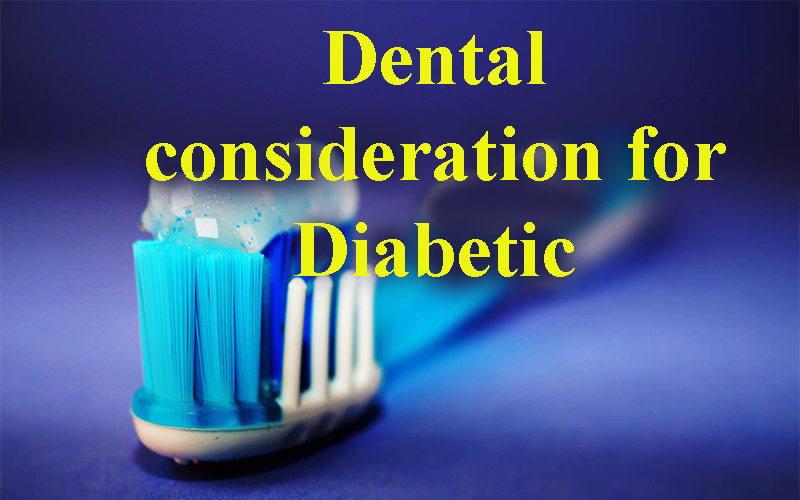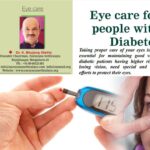Dental consideration for diabetics – A regular checkup to prevent gum diseases, deep cleaning for oral hygiene and to regulate the blood sugar levels.
Diabetes, a very common condition encountered by dentists in Dental offices most frequently. Diabetes Mellitus is a group of the disease characterized by high levels of blood glucose levels in the blood.


The most common types of Diabetes are Type 1 and Type 2 diabetes. Type 1 diabetes is most commonly seen in young individuals that are less than 20 years of age and have a genetic connection. Insulin is needed to regulate blood glucose levels.
Type 2 diabetes is more common than type 1 and is associated with symptoms such as unexplained weight, increased hunger, increased frequency of urine, delayed healing of wounds, and fatigue.
Other complications with long-term uncontrolled diabetes include complications such as kidney disease, heart diseases, vision problems, and dental diseases
Diabetes and an action plan for dental health are a must for a healthy smile. You must always try to control your blood sugar by following a healthy lifestyle, getting your investigations done on time, take your medications as prescribed, and most importantly maintaining your oral hygiene status and keeping your mouth healthy.
A regular dental visit at least every 6 months is important to prevent the chances of having gum diseases and dental caries. A regular checkup also prevents the progression of gum diseases. Getting a professional deep cleaning of your teeth by a dentist not only improves the oral hygiene status but also regulate the blood sugar levels.
Oral manifestation of Diabetes
Oral manifestations of uncontrolled diabetes in patients could be frequently observed by dentists. The oral manifestations can be seen in the form of Dry Mouth (Xerostomia ), Burning sensation in the tongue and mouth, Increased severity of infections most common fungal infections like Candidiasis, Gingivitis, Periodontitis.
Diabetes and Dental Problems
The higher the blood glucose level, the higher is the risk of oral health problems among patients. The most common oral health problems encountered in diabetics are –
Gingivitis (gum disease) – Gum disease or gingivitis in simple terms is inflammation of gums. It occurs when plaque and tartar remain on the teeth for a long duration and is not cleaned properly thus leading to gum inflammation or gingivitis. Thus the gums become swollen, bleed, and painful to touch.
Dental Caries – Dental decay or caries occurs when the sugar in food and beverages interact with the bacteria in the mouth and form a thin film on the surface of the teeth. If the teeth are not cleaned properly it can lead to Dental caries more often.
Advanced gum disease (Periodontitis ) – When gingivitis is left untreated it can lead to an advanced and more serious infection in the form of periodontitis. In periodontitis, the soft tissue and bones are more severely affected. The advanced infection can even loosen the teeth and probably tooth loss. Since diabetes lowers the ability to resist infection and delayed healing the gingivitis should be treated on time to prevent the chances of periodontitis.
Oral thrush – Diabetics more frequently develop a fungal infection in the form of oral thrush that is caused by Candida. It may be seen as painful white and red patches in the mouth. Good oral hygiene is the only method to prevent these infections.
Xerostomia (dry mouth ) – Due to lack of saliva in diabetics Dry mouth is the most common symptom patients complain of. Lessor no saliva increases the risk of dental decay, oral thrush, and gum diseases.
Also watch ಬೇಸಿಗೆಯಲ್ಲಿ ಆಹಾರ ಹೇಗಿರಬೇಕು
Dental consideration for people with diabetes
Diabetes can arise at any age so the dentist should ask the patient’s medical history and evaluate oral symptoms in uncontrolled diabetes. The dentist should ask various questions before treatment like –
1. Type of diabetes whether it Type 1 or Type 2.
2. At what age diabetes was diagnosed .
3. Medications for diabetes .
4. Recent HbA1C result.
5. Any oral manifestations like mouth sores, fungal infections such as candidiasis.
6. Any gum diseases such as Gingivitis or Periodontitis .
7. Other medical conditions such as blood pressure, kidney problems, delayed wound healing.
The other factors to be taken care of –
Morning appointments for diabetic patients are advisable since chances of sudden hypoglycemia are less because of higher cortisol levels in the blood. For the patients who are on insulin therapy, their appointments should be scheduled according to their insulin dose to prevent the risk of hypoglycemia.
The patient is advised to eat something and take his /her medications on time before the appointment.
The surgical procedures can be planned if the patient has well-controlled diabetes while for patients with uncontrolled or poorly controlled diabetes the procedures are delayed until the diabetes is controlled.
A dentist must always try to co-ordinate with the physician of the patient to plan the dental treatment in a controlled manner.
If required the laboratory tests should be done for patients to know about any diabetic complication that may arise after dental procedures
In the case of surgical procedures, the before and after diabetic control is a must so the dentist and the physician must co-ordinate properly to prevent the risk of any emergency condition in diabetics.
Although the diabetic patients recognize the emergency of hypoglycemia as they are well versed with signs and symptoms of hypoglycemia most of the time but the staff in the dental office should also be trained well enough in managing the diabetic patients. While carrying out surgeries that are of long duration, oral glucose drinks and tablets should be kept in the office and used in case of emergency.
Diabetes and Dental Care
Dental care is of utmost importance in people with diabetes especially those who have uncontrolled diabetes. Thus diabetes and dental care should be taken care of seriously.
Maintain your blood sugar levels by following the doctor’s instruction of on-time investigation and medications on time. Controlled diabetes reduces the risk of the development of gingivitis, dental decay, and periodontitis.
Regular brushing your teeth in the morning and night is mandatory with a soft bristle toothbrush and fluoridated toothpaste. If possible rinsing your mouth after every meal is mandatory. Change your toothbrush after every 3 months.
Flossing at least once a day prevent various infections such as gingivitis.
Schedule regular dental visits after every 6 months to get a professional dental cleaning along with a checkup of the oral cavity.
Inform your dentist about your diabetes, type of diabetes, the medications you are taking so that the treatment is planned accordingly.
Regular dental checkup helps in looking for early signs of any gums and mouth disease. Inform your dentist if you have dry mouth, bleeding from gums, pain in the oral cavity.
Smoking increases the risk of gum diseases as well as lead to serious diabetic complications too. Try to quit smoking if you are not able to quit taking the help of your doctor.
On the final note, I would like to conclude managing diabetes requires proper care and treatment along with that taking care of oral health and dental health is a lifelong commitment. Health teeth, gums, and oral cavity would surely help in improving diabetes too.


Dr Jyotsana Anand Suri
Certified medical content writer
Email: jyotsana789@gmail.com











